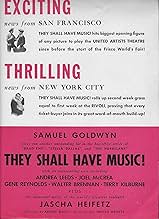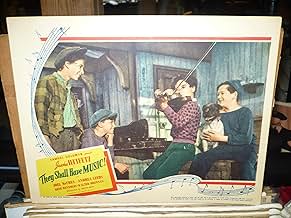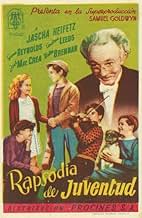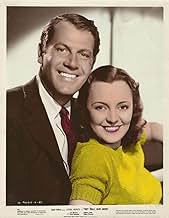VALUTAZIONE IMDb
6,9/10
563
LA TUA VALUTAZIONE
Aggiungi una trama nella tua linguaA boy runs away from home and ends up at a music school for poor children. When the school suffers hard times, he enlists the aid of violinist Heifetz to save the day.A boy runs away from home and ends up at a music school for poor children. When the school suffers hard times, he enlists the aid of violinist Heifetz to save the day.A boy runs away from home and ends up at a music school for poor children. When the school suffers hard times, he enlists the aid of violinist Heifetz to save the day.
- Regia
- Sceneggiatura
- Star
- Candidato a 1 Oscar
- 3 vittorie e 1 candidatura in totale
Gale Sherwood
- Betty
- (as Jacqueline Nash)
Alexander Schoenberg
- Menken
- (as Alexander Schonberg)
Recensioni in evidenza
I really enjoyed this movie, and I'm not a classical music fan. The story of the tough street kid discovering classical music and changing his ways was great to watch, without being sentimental or too unbelievable, although some details had me scratching my head (Frankie and his dog can live in the basement of the school without any of the students or teachers discovering him? Where did he eat? Bathe? Did he ever get a change of clothes? What did he feed his dog? The owner of the school didn't think it was important to notify the police about finding a missing boy, but let him live in the basement indefinitely? :-) ). But we can let such unrealistic details slide and just enjoy the touching, fun, and slightly suspenseful (for me, anyway) story and wonderfully talented children.
I loved the scene with the mothers standing shoulder to shoulder on the steps barring the policemen from entering the school: I doubt they would get away with that nowadays. And I liked the nice touch about the boy Frankie stole from turning the tables on him (although that never really went anywhere), and Frankie's friends helping him out in the end.
All in all, a great movie for everyone!
I loved the scene with the mothers standing shoulder to shoulder on the steps barring the policemen from entering the school: I doubt they would get away with that nowadays. And I liked the nice touch about the boy Frankie stole from turning the tables on him (although that never really went anywhere), and Frankie's friends helping him out in the end.
All in all, a great movie for everyone!
They Shall Have Music from 1939 stars violinist Jascha Heifetz as himself, Joel McCrea, Gene Reynolds, Walter Brennan, Marjorie Main, and a favorite performer of mine, Zero the Dog. Directed by Archie Mayo.
The basic story concerns a boy (Reynolds) who runs away from home and winds up in a music school for kids. Gifted musically, he attempts to help the school stay open by appealing to Heifetz.
The star, of course, is Heifetz' magnificent playing. Though the film states he plays a Stradivarius, that violin name was thought to be more recognizable to audiences than his actual instrument, a Guarnarius. How wonderful to have Heifetz' gorgeous work on film.
If you like opera, you haven't lived until you've heard nine-year-old Gale Sherwood singing Caro Nome. I know hearing a child squeak out the coloratura was a life-changing experience for me.
In fact, Gale Sherwood grew up to be a lovely soprano who made films, did a nightclub act with Nelson Eddy, performed The Desert Song on tv, and Showboat at the LA Music Center. Then she moved to Florida and retired. She can be heard as an adult on YouTube.
I saw Zero the Dog in High Sierra. His role on that film was a tad more dramatic, but he was a delightful thespian and did a great job in this.
The basic story concerns a boy (Reynolds) who runs away from home and winds up in a music school for kids. Gifted musically, he attempts to help the school stay open by appealing to Heifetz.
The star, of course, is Heifetz' magnificent playing. Though the film states he plays a Stradivarius, that violin name was thought to be more recognizable to audiences than his actual instrument, a Guarnarius. How wonderful to have Heifetz' gorgeous work on film.
If you like opera, you haven't lived until you've heard nine-year-old Gale Sherwood singing Caro Nome. I know hearing a child squeak out the coloratura was a life-changing experience for me.
In fact, Gale Sherwood grew up to be a lovely soprano who made films, did a nightclub act with Nelson Eddy, performed The Desert Song on tv, and Showboat at the LA Music Center. Then she moved to Florida and retired. She can be heard as an adult on YouTube.
I saw Zero the Dog in High Sierra. His role on that film was a tad more dramatic, but he was a delightful thespian and did a great job in this.
You may have heard that music is the universal language. Nowhere is that more true than in Archie Mayo's "They Shall Have Music". It focuses on a troubled boy who runs away from home and joins a struggling music school. Things take a turn when Jascha Heifetz (playing himself) enters the scene.
The movie addresses poverty and funding for the arts. And in the process, we get to hear some masterful performances of works by the great composers (and of course, during the Barber of Seville overture, I pictured Bugs Bunny subjecting Elmer Fudd to all sorts of humiliation to the tune of the overture). No surprise that the children perform the music exquisitely, since Samuel Goldwyn hired the Meremblum Orchestra to star in the movie.
It might not be the greatest movie ever made, but I hope that it reminds people of the importance of the arts. Indeed, during WWII, Winston Churchill got asked if he planned to cut funding for the arts to redirect the money to the armed forces, and he said "Then what are we fighting for?" Alfred Newman's Academy Award-nominated score is like a character by itself. I definitely recommend this movie.
The movie addresses poverty and funding for the arts. And in the process, we get to hear some masterful performances of works by the great composers (and of course, during the Barber of Seville overture, I pictured Bugs Bunny subjecting Elmer Fudd to all sorts of humiliation to the tune of the overture). No surprise that the children perform the music exquisitely, since Samuel Goldwyn hired the Meremblum Orchestra to star in the movie.
It might not be the greatest movie ever made, but I hope that it reminds people of the importance of the arts. Indeed, during WWII, Winston Churchill got asked if he planned to cut funding for the arts to redirect the money to the armed forces, and he said "Then what are we fighting for?" Alfred Newman's Academy Award-nominated score is like a character by itself. I definitely recommend this movie.
This is a remarkable and wonderful film. In 1939, the classical violinist Jascha Heifetz (generally regarded by common consent in the classical music world as the greatest violinist of the 20th century, which is certainly my view) was actually a popular icon in America. So far have cultural standards declined that such a thing would be impossible to imagine today, in a world contaminated by Madonnas and Kylies and other such low life characters who prance around showing off their tits and bottoms and think of themselves as 'musicians'. And so Samuel Goldwyn decided to make a whole feature film around Heifetz, admirably directed by Archie Mayo. The story is first rate, and Heifetz is portrayed as a stratospheric and inaccessible concert star who happens to run into a poor kid in New York, through a series of amusing circumstances, and thereby becomes involved with the fate of a music school for disadvantaged urban children. The school is continually threatened with closure through lack of funds, but no one dares tell the idealistic head of the school, played by the endearing Walter Brennan, that there are drastic debts owing and angry creditors at the door. In one hair-raising scene, a ruthless music instrument supplier has removal men seize all the instruments from the children of the school's orchestra when they are in the middle of a concert. Joel McCrea is very good as the cheerful beau of Brennan's daughter, sympathetically played by Andrea Leeds, who cheerfully loses his job in order to help support the school and the cause of encouraging poor children to learn music. The star of the film is Gene Reynolds, who plays the poor boy Frankie at the centre of the story who enters the school because he has perfect pitch (or 'a good ear', as Brennan modestly puts it). Reynolds is admirably supported by one of the finest canine actors of the period, a little dog called Zero, who plays the character Sucker, a dog who is Frankie's inseparable companion. Child actor Terry Kilburn is also extremely good as Frankie's younger friend Limey, so named because he is British and sounds it. He is such a cheerful little chap. This film was entitled RAGGED ANGELS in a re-release at a later date in America, but in Britain was called MELODY OF YOUTH. Jascha Heifetz plays numerous extended virtuoso pieces in this film, such as RONDO CAPRICCIOSO by Camille Saint-Saens. No trouble is spared to film him from every angle, with plenteous close-ups of his fingers, his bowing technique, and views of him of every description. He also speaks and briefly 'acts' in a few scenes. From the point of view of the history of music and the violin, this film is a 'must-see' because of the extensive coverage given to Heifetz, around whom the whole film revolves. It was the first time he had appeared in a film. As all who have ever seen archive film of him playing know, Heifetz showed absolutely no emotion when he played, but while remaining as formal as a Greek statue, he could wring more emotion out of his violin than anyone since Paganini, and more than anyone since. He was simply the greatest. And what a treasure this film is, to contain such an early record of his performing. As for the film itself, it is charming and delightful, and most entertaining. It is most emphatically not just a story strung carelessly together to provide an excuse for getting Heifetz on screen. In fact, it is a pity that young people interested in music today cannot all be shown this film in school. I would recommend most strongly to any parents with a child serious about classical music that they show this film to the child. It also carries an important message about the power of music to uplift those who are in unfortunate circumstances and in great poverty. The scene where the mothers of the children block the entrance to the school to stop the men coming in to seize the instruments is touching testimony to how hard times produce backbone and determination. The social lesson is the need to spread classical music more widely through all levels of society. After all, it is such a civilising influence, and there are not many civilising influences left, are there? Isn't it better to be taught to play an instrument and to take part in a student orchestra than to sit at home playing computer games in which you kill people until you are so brutalised that you then pick up a gun from your father's gun cabinet yourself and carry out one of those school massacres? All of those student atrocities I blame on the parents, by the way, since the kids who carry them out are always the spoilt brats of spineless affluent upper middle class families, whose parents should be locked up as incompetents and enablers of their psychopathic offspring. Anyone in search of a bit of sanity in a world full of bad parents and vicious spoilt kids should watch this film, to remember that there was an innocent time when the worst entertainment to which children used to be exposed was likely to be the insipid charms of cowboy heroes like Gene Autrey and Roy Rogers, or perhaps a highly unconvincing monster from outer space invading the earth. Today all the monsters are here already, and do not need to be imported from other worlds. The 'other world' of today is the world of yesterday.
THEY SHALL HAVE MUSIC (United Artists, 1939), directed by Archie Mayo, became producer Samuel Goldwyn's tribute to classical music through the eyes and talent of young children. Headlined by Jascha Heifetz (1901-1987), a celebrated violin virtuoso, with name above the title, ahead of renowned screen veterans Joel McCrea, Andrea Leeds and Walter Brennan, this production might have served as a biographical subject on Heifetz with him enacting his own story up to his legendary status. Instead, it's something completely different, dedicated "To the many schools throughout the world --- devoted to the development and encouragement of great talent among the children of the poor." The main character of the story isn't any of the actors mentioned, but the fourth billed Gene Reynolds, who actually carries the 102 minute film from start to finish.
As Frankie Miller, he's a tough New York City slum kid living with his kindhearted mother, Jane (Marjorie Main) and strict stepfather, Ed (Arthur Hohl). He's also leader and treasurer of a group of boys, Limey (Terry Kilburn), Rocks (Walter Tetley) and Fever (Chuck Stubbs), spending much time on the streets getting in trouble with authorities and neighbors. One evening, Frankie and Limey find two unused tickets to a Jascha Heifetz concert. Unable to pawn off the tickets, they attend the recital instead. With Limey bored to tears, Frankie takes much interest in Heifetz. After returning home, he acquires his late father's fiddle to develop his musical talent imitating Heifetz. A heated argument with his stepfather follows, whom he nearly attacks, causing Frankie to run away and avoid being arrested and taken to reform school. Very much on his own, carrying a violin case for food and supplies, the boy earns money shining shoes by day and sleeps in an abandoned car by night. Things start to look better for Frankie after befriending a stray dog he names "Sucker," later leading him into a Third Street music school for poor children. Finding "Frankie Smith" to have an ear for music, and no place to stay, Professor Lawson (Walter Brennan, in fine characterization), the school's founder, offers the teenager room and board and acceptance as one of his pupils. Because the school is six months behind on their rent, and unable to survive on donations alone, Mr. Flower (Porter Hall), whose associate, Peter McCarthy (Joel McCrea), who never bothered to collect due to his love for Lawson's daughter, Ann (Andrea Leeds), threatens to close down the school. Through Frankie's good intentions, he makes efforts to save the school by trying to speak to Mr. Heifetz at his home. Situations become more complex when Heifetz's $70,000 Stradivarius is reported missing and now in Frankie's possession.
In a sense of being an original story, the screenplay tends to borrow portions from Goldwyn's own DEAD END (1937), using tough kids from New York's poor district as main attractions, and Universal's ONE HUNDRED MEN AND A GIRL (1937), with talented teenage singer (Deanna Durbin) helping her father's unemployed musicians by getting the sponsorship of musical conductor Leopold Stokowski. Whether intentional or not, THEY SHALL HAVE MUSIC does get by on its own merits, especially with interludes to fine classical pieces consisting of: Peter Tchiakowsky's "Andante Cantabile" from "String Quartet No.1 in D, Opus 11"; "Introduction and Rondo Capriccioso, Opus 28"; Frederic Chopin's "Nocturne in B Flat Minor, Opus.9, No.1"; "Caro Nome" from Giuseppe Verdi's "Rigoletto" (beautifully sung by Jacqueline Nash); Wolfgang Mozart's "Eine Kleine Nachtmusik" "Hora Staccato" and "Estrellita" "The Barber of Seville," "The Minute Waltz in D Flat" (piano played Mary Ruth); "Symphony No.4 in A ('Italian'), Opus. 90," "Casta Diva," and "Violin Concerto in E Minor." Others participants to these compositions aside from Heifetz include the California Junior Symphony Orchestra.
In spite of its somewhat contrived screenplay held together through a series of circumstances, THEY SHALL HAVE MUSIC is as entertaining as it is underrated. With McCrea and Leeds having little to do, with Heifetz having even less by way of acting, Gene Reynolds, a fine young actor with sincerity and conviction, on loan out assignment from MGM, never developed into a top teen idol as did box office attraction Mickey Rooney. Nearly forgotten as an actor, Reynolds did become better known in later years as director and producer of TV shows, especially the long running, MASH (CBS, 1972-1983). Tommy Kelly, lead boy actor in 1938's "Adventures of Tom Sawyer," and "Peck's Bad Boy at the Circus," is reduced to minor role as Willie, the kid whom Frankie hounds for membership dues for the club.
With this being an overlooked Goldwyn production, THEY SHALL HAVE MUSIC did get plenty of exposure over the years, through its 1986 video cassette distribution; cable television broadcasts on American Movie Classics (1992-94) and Turner Classic Movies (where it premiered March 30, 2007). Anyone seeking for relatively unknown movie, this is one to consider, along with another similar themed production of MUSIC OF THE HEART (Miramax, 1999) featuring Meryl Streep. (***1/2)
As Frankie Miller, he's a tough New York City slum kid living with his kindhearted mother, Jane (Marjorie Main) and strict stepfather, Ed (Arthur Hohl). He's also leader and treasurer of a group of boys, Limey (Terry Kilburn), Rocks (Walter Tetley) and Fever (Chuck Stubbs), spending much time on the streets getting in trouble with authorities and neighbors. One evening, Frankie and Limey find two unused tickets to a Jascha Heifetz concert. Unable to pawn off the tickets, they attend the recital instead. With Limey bored to tears, Frankie takes much interest in Heifetz. After returning home, he acquires his late father's fiddle to develop his musical talent imitating Heifetz. A heated argument with his stepfather follows, whom he nearly attacks, causing Frankie to run away and avoid being arrested and taken to reform school. Very much on his own, carrying a violin case for food and supplies, the boy earns money shining shoes by day and sleeps in an abandoned car by night. Things start to look better for Frankie after befriending a stray dog he names "Sucker," later leading him into a Third Street music school for poor children. Finding "Frankie Smith" to have an ear for music, and no place to stay, Professor Lawson (Walter Brennan, in fine characterization), the school's founder, offers the teenager room and board and acceptance as one of his pupils. Because the school is six months behind on their rent, and unable to survive on donations alone, Mr. Flower (Porter Hall), whose associate, Peter McCarthy (Joel McCrea), who never bothered to collect due to his love for Lawson's daughter, Ann (Andrea Leeds), threatens to close down the school. Through Frankie's good intentions, he makes efforts to save the school by trying to speak to Mr. Heifetz at his home. Situations become more complex when Heifetz's $70,000 Stradivarius is reported missing and now in Frankie's possession.
In a sense of being an original story, the screenplay tends to borrow portions from Goldwyn's own DEAD END (1937), using tough kids from New York's poor district as main attractions, and Universal's ONE HUNDRED MEN AND A GIRL (1937), with talented teenage singer (Deanna Durbin) helping her father's unemployed musicians by getting the sponsorship of musical conductor Leopold Stokowski. Whether intentional or not, THEY SHALL HAVE MUSIC does get by on its own merits, especially with interludes to fine classical pieces consisting of: Peter Tchiakowsky's "Andante Cantabile" from "String Quartet No.1 in D, Opus 11"; "Introduction and Rondo Capriccioso, Opus 28"; Frederic Chopin's "Nocturne in B Flat Minor, Opus.9, No.1"; "Caro Nome" from Giuseppe Verdi's "Rigoletto" (beautifully sung by Jacqueline Nash); Wolfgang Mozart's "Eine Kleine Nachtmusik" "Hora Staccato" and "Estrellita" "The Barber of Seville," "The Minute Waltz in D Flat" (piano played Mary Ruth); "Symphony No.4 in A ('Italian'), Opus. 90," "Casta Diva," and "Violin Concerto in E Minor." Others participants to these compositions aside from Heifetz include the California Junior Symphony Orchestra.
In spite of its somewhat contrived screenplay held together through a series of circumstances, THEY SHALL HAVE MUSIC is as entertaining as it is underrated. With McCrea and Leeds having little to do, with Heifetz having even less by way of acting, Gene Reynolds, a fine young actor with sincerity and conviction, on loan out assignment from MGM, never developed into a top teen idol as did box office attraction Mickey Rooney. Nearly forgotten as an actor, Reynolds did become better known in later years as director and producer of TV shows, especially the long running, MASH (CBS, 1972-1983). Tommy Kelly, lead boy actor in 1938's "Adventures of Tom Sawyer," and "Peck's Bad Boy at the Circus," is reduced to minor role as Willie, the kid whom Frankie hounds for membership dues for the club.
With this being an overlooked Goldwyn production, THEY SHALL HAVE MUSIC did get plenty of exposure over the years, through its 1986 video cassette distribution; cable television broadcasts on American Movie Classics (1992-94) and Turner Classic Movies (where it premiered March 30, 2007). Anyone seeking for relatively unknown movie, this is one to consider, along with another similar themed production of MUSIC OF THE HEART (Miramax, 1999) featuring Meryl Streep. (***1/2)
Lo sapevi?
- QuizIn the movie, the newspaper account lists Jascha Heifetz's stolen violin as a Stradivarius. Heifetz used a Guarnarius in the picture and favored that violin in real life, but the producers felt that the name of Stradivarius would be more recognizable.
- BlooperThroughout the picture, the kids in the orchestra are caught looking into the camera or eyeing it sideways, licking their lips, fidgeting, etc.
- Colonne sonoreAndante cantabile
from "String Quartet No.1 in D, Op.11" (1871) (uncredited)
Written by Pyotr Ilyich Tchaikovsky
In the score during the opening credits
Reprised a bit by Gene Reynolds (violin)
I più visti
Accedi per valutare e creare un elenco di titoli salvati per ottenere consigli personalizzati
- How long is They Shall Have Music?Powered by Alexa
Dettagli
- Tempo di esecuzione1 ora 42 minuti
- Colore
- Proporzioni
- 1.37 : 1
Contribuisci a questa pagina
Suggerisci una modifica o aggiungi i contenuti mancanti

Divario superiore
By what name was Armonie di gioventù (1939) officially released in India in English?
Rispondi























